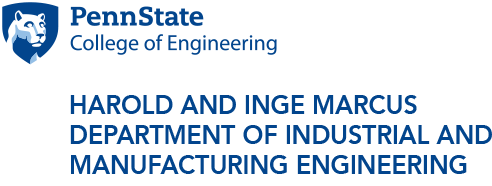
Vittal Prabhu (second from left) and Rakshith Badarinath (far right) are working to convert manufacturing machines into 3D printers.
Industrial engineers place third in national manufacturing competition
6/28/2017
UNIVERSITY PARK, Pa. — A Penn State industrial engineering graduate student and his adviser addressed the need for process models in additive manufacturing on their way to a third place finish in the National Institute of Standards and Technology Reusable Abstractions of Manufacturing Processes (RAMP) Challenge.
Rakshith Badarinath and Professor Vittal Prabhu earned a $500 prize for their entry, titled “Modeling for Fused Filament Fabrication Additive Manufacturing Process.”
Participants in the RAMP Challenge were asked to provide manufacturers with models that will improve operations, protect the environment and allow information to be shared while integrating them into working systems. They were required to use the ASTM Standard Guide for Characterizing Environmental Aspects of Manufacturing Processes in their proposals.
Proposals were judged on complexity, clarity, accuracy, novelty and presentation.
Badarinath and Prabhu focused on Fused Deposition Modeling (FDM) as their entry to the competition. FDM is a type of additive manufacturing in which a 3D object is directly manufactured from 3D computer-aided design (CAD) data, layer by layer, using a molten thermoplastic that is extruded from a fine nozzle. The molten material solidifies immediately after it is extruded so the next layer can be built upon the previous layers.
The larger the size of the nozzle, the more material can be deposited in a shorter time; however, it would also result in less precision of the part due to coarse layers.
“Even though FDM is one of the most widely used 3D printing technologies, the process science isn’t well explored yet and that was the motivation (for the RAMP proposal),” said Prabhu. “We looked at the engineering science for the physics of this 3D printing process in our model to make the process smarter in the future.”
Badarinath and Prabhu are using this technology on a larger project that will enable robots on a manufacturing company’s floor to use this technology to 3D print parts rather than buying a commercial 3D printer.
“Essentially we are trying to construct a robot under our control that is able to print parts using FDM,” explained Prabhu.
Prabhu and Badarinath are doing this by retrofitting the ABB robots in the Factory for Advanced Manufacturing Education with hardware that will allow the robot to hold a nozzle and use the FDM technology to print a part.
“Not only would this be more economical for a manufacturer, it would also make use of the machines they already employ for other tasks,” said Prabhu.
This project is part of a larger proposal by Prabhu and Professor Sanjay Joshi that will convert manufacturing machines into 3D printers. Titled “Collaborative Robot Based Smart Fused Deposition Modeling,” the project is supported by the Entrepreneurship and Innovation Fund within the Harold and Inge Marcus Department of Industrial and Manufacturing Engineering.
Badarinath, a native of Tumkur in Karnataka, India, is a doctoral student who is spending the summer working as an additive manufacturing intern with TE Connectivity in Middletown, Pennsylvania. In this role, he is part of an advanced manufacturing group that is looking at ways of adopting various 3D printing technologies into manufacturing of existing product lines and also new products.




